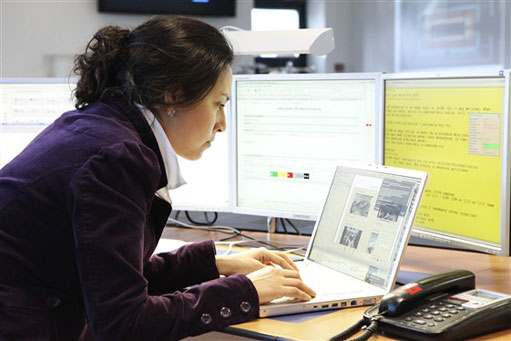
ATLAS e-News
23 February 2011
Celebrating past achievements
29 March 2010

Isabel Pedraza edits the Women's Day website while on a Data Quality Monitoring shift
On March 8th, CERN celebrated the 100th International Women’s Day with an event designed to highlight how far women have come in High Energy Physics. Images of high ratios of female shifters working in the accelerator and experimental control rooms were webcast throughout the day; a strong and welcoming visual message to young girls considering physics, technology, and engineering careers.
In the ATLAS Control Room, Shift Leader Nicoletta Garelli found symbolic relevance in her role: “For me it was a nice way of showing that I am happy and proud of my job, knowing that nowadays the same is not true for many other women in the world, since there are still many who suffer from discriminations,” she says, adding: “Working in the control room was the best way I had to testify to the results achieved in the last century concerning equal opportunities in Europe.”
Lucia Zanello, who was working a shadow shift for the Trigger on March 8th, says that the shift felt routine: “I did not notice any big difference with respect to the normal shifts, except a sort of elation, coming from the feeling that we can, and maybe a better sharing of information and of help between us.”
Run Coordinator Benedetto Gorini was in high spirits on the celebratory day, which he says went without a hitch: “What I particularly appreciated is that, from the operations point of view, the day could have passed completely unnoticed. We didn't have to make too many special arrangements, as we already have a number of very effective female shifters who are naturally involved in operating ATLAS, outside of Women's Day.”
Where once High Energy Physics was the sole preserve of male scientists, today at ATLAS there are women at all levels, including project leaders, physics group coordinators, and sub-system run coordinators. ATLAS Spokesperson Fabiola Gianotti took part in a videoconference with those running a similar event at Fermilab, and reiterated that opportunities in this field should be (and are) earned via talent, and not influenced by any other factor.
Nicoletta can attest to this: “[Being] a woman at CERN working in the ATLAS collaboration is a great experience, and I have honestly never felt discriminated, neither concerning the country of origin, nor the culture, nor the gender.”
While many at CERN were in favour of the day’s special activities, some had reservations about the message that all-female shifts might communicate. TileCal Project Leader, Ana Henriques was concerned that, “to populate the control rooms only with women … would be giving the wrong impression to the outside that the experiment is run only by women”.
The compromise reached for the day – predominantly-, but not exclusively-, female shift crews – was more acceptable to Ana, who felt that this better represented the situation at CERN, “showing perfect integration of men and women working together”.
Elsewhere, some felt that the CERN events missed the point somewhat; that nowadays the pressing issue is not encouraging young girls to study physics and pursue technical and scientific careers, but rather the much-discussed ‘leaky pipeline syndrome’ which sees females leaving the profession at all stages. Short research contracts, a highly competitive atmosphere, and limited childcare options are particularly incompatible with raising a family.
“One big problem is that girls are leaving in droves at each step of the advancement ladder … I’m not sure a special day to acknowledge the contribution of women to the field is the way to make women stay in physics,” comments grad student Zach Marshall.
Ana agrees: “Where in practice things become more complicated is when women have small children. The CERN kindergarten closes for two months in summer … a very active period with all the accelerators working. For me, having good facilities for child care is one of the most important factors for women’s success in highly competitive fields [such as this], and to be able to keep a good balance between professional and family life.”
Lucia and Nicoletta outline similar problems, but Lucia (mother of four) maintains that her family has never meant that she could not be assigned the responsibilities she deserved.
Childcare is a notorious problem at CERN, but following recommendations brought forth by the CERN Childcare Initiative, a group started by the ATLAS Women’s Network, CERN management has recognised the need and is currently working in cooperation with the CERN Childcare Initiative, the CERN Equal Opportunities Officer and the Advisory Committee of CERN Users on a solution.
The Women’s Day event was covered in many media outlets, including Symmetry, Science’s ‘Science Careers’ blog, and American feminist magazine Ms – a first for CERN.
 Ceri PerkinsATLAS e-News
|